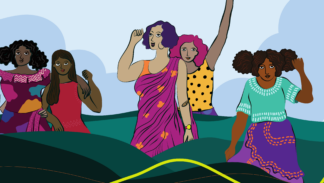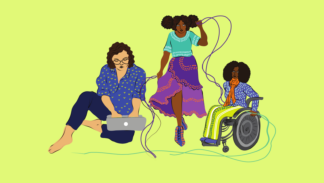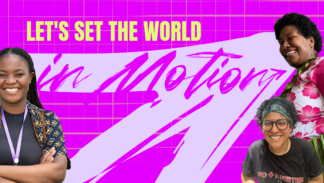How Trump's 'travel ban' impacts women's groups and activists in the Middle East
March 15, 2017: At the end of his first week in office, on January 27th, U.S. President Trump signed an executive order temporarily banning citizens from seven countries, including immigrants and refugees, from entering the U.S. Almost immediately, protests erupted at airports and in cities across the country, and outrage was heard from countries around the world. For the people from the seven countries targeted, there were mostly questions and rising fears. A federal appeals court panel maintained a freeze on Trump’s executive order, meaning previously banned individuals should be allowed to enter the U.S.
On March 6th, however, Trump and his administration carried through on promises to unveil an updated order by signing a new executive order to implement a revised version of the travel ban, with a few critical differences from the first. Most notably, the new order targets six Muslim-majority countries, removing Iraq from the ban, exempts current visa holders, and drops the indefinite ban on Syrian refugees—reducing instead to 120 days.
On March 15th, hours before this executive order was due to begin, Federal judges in Hawaii and Maryland blocked the travel ban from taking effect. Yet questions and uncertainty about the ban remain.
Global Fund for Women reached out to our network of grassroots women’s groups, advisors, and human rights activists in the original seven countries targeted—Syria, Iran, Iraq, Somalia, Libya, Sudan, and Yemen—to understand how the U.S. travel ban is impacting them and how women’s groups on the ground are responding.
Rising concerns of distance between women’s groups in targeted countries and the U.S.
While the new ban is technically stayed, the women Global Fund for Women spoke with remain hesitant to travel to the U.S. and have cancelled existing plans.
“We are seeing increased concern particularly amongst the elderly women who may have children living in the U.S. far from them,” explained one of Global Fund for Women’s partners in Iraq.
Further, women’s groups fear that the travel ban could weaken or damage existing relationships with U.S. women’s rights organizations or U.S.-based international NGOs.
“This decision will strip Iraqi women of the right to visit the U.S. and engage with women’s organizations there,” said one woman who works with Global Fund for Women’s grantee partner Ajial Association for Intelligence and Creation Development in Diyala, Iraq, which works to educate and empower the next generation of Iraqis. “It will implant a sense of shame at being a certain nationality that the president deemed to be terrorist. We hope this ban will be overturned.”
Implications for participation in UN CSW, a critical international space
With the annual United Nations Commission on the Status of Women (CSW) happening March 13th-24th in New York, our partners point out that the travel ban has directly impacted their plans to participate in this space.
“We are facing trouble in terms of vagueness of the situation,” said one of Global Fund for Women’s partners in Yemen, about their advisor who was planning on traveling to New York to participate in CSW and has a valid travel visa through April. “We don’t understand if this executive order is implemented or canceled. We are concerned that if she travels, she will face risks.”
This uncertainty caused by the U.S. travel ban carries implications for participation of women from the seven countries targeted at this year’s CSW. For women’s activists and civil society organizations around the world, the CSW is a critical international space that presents an opportunity to engage with and share learnings with other women’s groups from around the world.
It also means opportunities to meet with new prospective donors and U.S.-based funders. For some women’s groups from countries like Iraq and Yemen, this would have been their one time this year to meet with U.S.-based donors.
The travel ban could have an impact on the ability of grassroots women’s groups in the Middle East to raise more funding for upcoming projects—or could directly impact their ability to carry out current programs. At a time of political turmoil and increasing violence, this lack of funding for women’s groups could carry serious reverberations for women and families, and for women’s rights in the long-term.
”We will be unable to attend CSW this year and this will impact our ability to meet with prospective donors,” explains Liza Hido, a Global Fund for Women advisor in Iraq and President of Baghdad Women Association, a longtime grantee partner focused on women’s empowerment and education as well as assisting internally displaced people fleeing ISIS in Iraq. “This will further impact the sustainability of our activities at a critical time.”
Stifling women’s voices, potential impact on peace-building
Beyond direct impact on funding, women’s groups we spoke with pointed to an alarming potential to further stifle women’s voices in international bodies in the United Nations and otherwise. Women we spoke with feared this could mean even fewer opportunities for women from countries in turmoil to be included in UN negotiations or peace-building conversations.
“As Palestinian refugees, we have already had huge difficulties—mainly impossibilities—in entering the U.S., not only as migrants, but also as visitors,” explained Global Fund for Women advisor in Lebanon Khalidat Hussein, who leads the work of grantee partner Tadamon (Arabic for “solidarity”) with women refugees in Lebanon’s crowded refugee camps. “The latest decision of the U.S. president has worsened conditions and closed any weak hope for the voices of women or other Palestinian refugees to be heard by any UN panels or committee meetings.”
For women’s groups in Yemen, the travel ban means that women will not have a seat at the table for ongoing UN peace talks, and they fear that this will have long-term ramifications for peace-building as well as women’s rights in the country.
“[An advisor] was supposed to go to meet different missions of the UN Security Council,” explains our partner in Yemen. “She was amplifying the voices of Yemeni women. She had messages on women, peace, and security. I think this ban is directly affecting efforts of peace-building. The UN should resolve this issue, or move to a country that has respect for human rights.”
In the long-term, Liza Hido points out, the travel ban “will certainly impact women’s rights activists as it will limit their movement and therefore limit their participation in international spaces—limiting them to only national or regional ones.”
Mobilizing on the ground to answer questions, educate women, prevent hate
As soon as Trump issued the original executive order in January, while people were galvanizing powerful protests and responses in the U.S., women’s groups in the seven countries named in the travel ban began mobilizing to raise awareness and make plans to campaign against it.
“As soon as the ban was issued, we immediately conducted an executive meeting to discuss the effects of such a ban on us as an organization, particularly since the majority of our funding comes from the U.S.,” explains one woman from Ajial in Iraq. “We decided to conduct local awareness campaigns to let people know that the decision by the U.S. president does not in fact express the true sentiment of the U.S. people nor that of U.S. women’s rights organizations.”
Another Global Fund for Women grantee partner in Iraq, Iraqi Women Development Center, is continuing to raise awareness and conducting workshops in order to ensure that lines of communication are not broken.
“We will work on raising awareness among women here on the importance of maintaining communication with women around the world and particularly the U.S.,” explained one woman from Iraqi Women Development Center. “We are soon conducting a workshop to explain the legal and social ramifications of the ban.”
“There will now be a wall between women in the region and rest of the world”
As questions and uncertainty remain among Global Fund for Women’s network in the Middle East, women are expressing fears that Trump’s executive order could cause irreparable separation between women in the region and people in the U.S.
“The decision might cause risks of separation between people in U.S. and the people in the Middle East and North Africa region and other parts of the world; such a ban is contradictory with human rights and our shared sense of global humanity,” explained Khalidat Hussein.
Hussein’s sentiments were echoed by women from Iraq as well, who cited even greater concerns.
“The women of Iraq will lose confidence in the U.S. administration and raise concerns that this administration’s policies will negatively affect U.S. organizations working to support women’s rights in the Middle East,” said one woman from Iraqi Women’s Development Center. “There now will be a wall between the women of the region and the women of the rest of the world. This is particularly important for the women of Iraq as they are in dire need to be aware of, and involved in, all the international laws and spaces. This ban will further increase the distance between us and international organizations.”
Global Fund for Women commits to continue to #BuildMovementsNotWalls and to ensure that women and girls in Yemen, Syria, Sudan, Somalia, Libya, Iran, and Iraq—and throughout the Middle East and in other Muslim-majority countries—do not feel a growing distance, but instead an even greater sense of support and solidarity from women around the world. We must do more to amplify women’s voices and share women’s stories as they will be missing from key international spaces and conversations. Stand with us.
As soon as the ban was issued, we immediately conducted an executive meeting to discuss the effects of such a ban on us as an organization, particularly since the majority of our funding comes from the U.S. We decided to conduct local awareness campaigns to let people know that the decision by the U.S. president does not in fact express the true sentiment of the U.S. people nor that of U.S. women’s rights organizations.”


